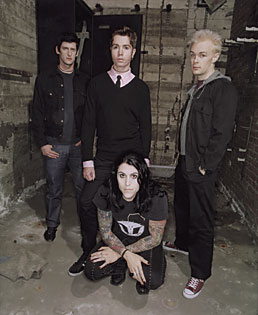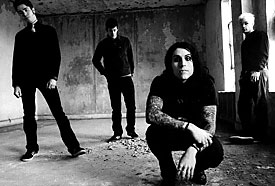 |
|
PHOTO COURTESY OF DREAMWORKS RECORDS
|
AFI's last album was produced by Jerry Fin (Rancid, Green Day) and Butch Vig (Nirvana, Smashing Pumpkins), which might explain why the band has a diverse fan base.
|
|
By Kevin Smith
Arizona Daily Wildcat
Thursday April 17, 2003
AFI will ĪSing the Sorrow' to Tucson at the Rialto
Countless bands struggle to work their way out of mediocrity. They play dive bars, coffee houses and street corners ÷ basically wherever someone will listen. Few bands ever shatter the glass-ceiling label of "local band" and ascend to the status of nationally recognized musicians.
For many years, San Francisco Bay area band AFI (A Fire Inside) strummed chord after chord, sang note after note, recorded EPs and LPs and played show after show while remaining on the threshold of relative obscurity.
Slowly, the band gained acceptance via an emerging fan base inside and outside of the Sunshine State. Even enduring two lineup changes (bass and guitar), the band persisted in delineating itself to a wider audience.
When and Where
· The catharsis will commence at 8 p.m. Tuesday at the Rialto. Tickets are $14.
|
Six full-lengths later, the band is now being praised by corporate America (Rolling Stone) for its newest release, the epic Sing The Sorrow.
Winning over big-money magazines isn't necessarily a sign of great artistic achievement, but it seems very far removed from the blood and tears of AFI's early days playing to half-empty audiences.
"Our fan base was non-existent for many years," said AFI drummer Adam Carson. "The first four or five years of the band, it was difficult to just get shows or to have anyone care at all."
Carson is one of two remaining founding members of AFI, the other being vocalist Davey Havok. Bassist Hunter joined the band for its third album and guitarist Jade Puget hopped on board for the fourth. The additions affected the band sonically, especially since Puget is credited as the primary pen for the last two albums.
 |
|
PHOTO COURTESY OF DREAMWORKS RECORDS
|
AFI began with four high school friends from Ukiah, Calif., in 1992. The band was first noticed nationally when The Offspring covered one of AFI's songs for the "Me, Myself & Irene" soundtrack.
|
|
"We've had two line-up changes," Carson said. "In a way, I kind of view it as two separate bands, you know? The whole time we've been in this band, we've been evolving to what we are today."
These transformations might be one of the reasons AFI doesn't have a pigeonholed sound. It could be described as punk with gothic overtones and dark lyrics, but in the form of a straight-up rock band. It's something that the listener kind of has to hear to understand.
"We each have sort of eclectic tastes," Carson said. "It's sort of a hodgepodge, like a melting pot of all these different influences that we have, but for some reason, there always ends up being that level of cohesion that's specific to AFI."
If the band's influences sound diverse, its fan base is twice as assorted. Everyone from skater kids to punks to metal heads to goths can be seen sporting AFI T-shirts.
"I think it's the greatest thing," Carson said. "I mean it's the result of us having diverse musical tastes and having that translate to the music and then eventually building on that and the songs appealing to as many different types of people because they are not definitely one type of song.
"We're not just purely a hardcore band, and we're not purely a punk band. And we're not purely a rock band, so we're a crossover, which is great because it seems that the music should be available to everybody, you know?"
AFI's fan base is as loyal as they come. Known to chant before the band even gets on stage, they are said to be as much a part of an AFI performance as the band.
"They're the most important part of what we do," he said. "I mean the most rewarding part of being in the band is playing live and the exchange of energy between us and the crowd; it's really cathartic for us. We kind of have to play live.
"That's where we feel the rewards of our work. And luckily we are blessed with the most dedicated fans, who make every show brilliant. You know it's not necessarily us getting up there and playing well; it's just the fact that the crowd is always so into it and always so, so responsive and supportive."
AFI crowds have not always been so responsive, however. Forming nearly 10 years ago in Ukiah, Calif., the band left the small town in hopes of a more welcoming San Francisco/Bay Area punk scene ÷ the same scene that had recently spawned punk-pop granddaddies Green Day.
"When we lived in Ukiah, no one cared at all," Carson reflected. "But when we moved down to the Bay Area, we started playing at Gilman Street. We started playing at local clubs a couple times a weekend for a year straight. Before we'd gone on tour, before we'd made a record, we just were playing these shows. And we had first 20, and then 50 people, and then it was 100 and then it kind of grew from there. And our fans have always been intensely loyal, and I'm not sure why, but we're pretty lucky."
Reflecting back, Carson said he does not feel vindicated for all of the hard work in the band's early years because he said there was a reason why it took the band so long to find its niche and the respective fan base.
"Vindication is not the right word because people didn't care about us because we sucked and they shouldn't have cared about us," he said. "It's arguable that our first couple records suck as well, although some people say they don't. I personally think that they're OK records, but I think they reflect the period where we were still growing as musicians and songwriters. I mean for what they are, I think they're special, but they're obviously not the best work of art in the world."
Carson thinks a reason why the band survived and became as strong as it has over the years is because of its simple, down-to-earth decision-making.
"The thing is · we've always been chasing small, small goals, you know?" he reasoned. "The goal was never to get where we are today. When we first started the band, the goal was to play a show. After that, the goal was just to put out our own 7-inch record, and then we accomplished that. And then it was like, ĪCan we go on tour for the first time?' And we accomplished that.
"It's not like we set our sights so high that it's taken us 12 years to get there and now finally we are vindicated and we've conquered the world. We've been doing this for so long because we love it, and it's rewarding to us every single day. We can quit today and feel like we've really accomplished a lot."
While the band continues its ascent into the arena of public knowledge and recognition, it remains unafraid of a possible backlash from the very scene that embraced it in its early days. It's hard to forget that the Bay Area punk scene is the same community that ousted and insulted fellow punkers Green Day once they hit it big in the mid-'90s.
"We're not afraid of that and we never really have been," Carson proclaimed. "I mean, we're comfortable with what we're doing and we think that we're · I mean, I think we made an OK record, and I think that it's the best record we could have made. Whether it's good or bad, it's the best we could do.
"I mean, it's the same record that we would have made had we been on Nitro or DreamWorks or Sony or any label. So, if there's a backlash from that, I really don't know what to tell those people, because we're just kind of doing our thing. I mean, the music. It's honest; it's what we want to play, and it's where we are as a band right now. And it'd be actually dishonest to try and sound any different."
Carson added that a lot has changed in the punk community since Green Day blew up.
"Also the climate's a lot different now; like, back then, you know, being a "sell-out," like being on a major label was like a horrible thing." he said. "Now these days it doesn't seem to matter as much. People aren't as focused on that."
Tucson really couldn't get a better time to see AFI than now, hot on the heels of its acclaimed new album. The band comes to the Old Pueblo for the first time in a long time (Carson speculated 1996).
One sure thing is that the band and its fans will be giving off the same energy that AFI has pulsed with since the very beginning, on a tour that has been selling out as fast as a reader can read these words.
"All I can say is that it's extremely cathartic for us," Carson said. "You know, sometimes I go onstage, and I come off and I don't remember what happened. So it's a complete exchange of energy. We get up there and we just do our thing and the people, you know, do their thing and it's just a really, really amazing interaction."

